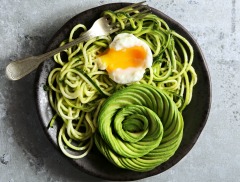Don't just meal plan... meal plan intelligently - with Meal Genius! Sign up for our free newsletter to get delicious recipes, sample meal plans and a whole lot more!
Cheese, Brie
Love it or hate it, Brie is the classic French cheese.
The bloomy rind on Brie results from Penicillium Candidum, a white mold applied to the surface. The mold produces enzymes which ripen the cheese from the outside in. Ripening occurs in just a matter of weeks.
Brie has a rich, earthy mushroom flavor changes from mild when young to pungent with age. It has a soft, creamy interior with snowy white, edible rind.
Because cheese is essentially milk that is condensed it is important to choose brie cheese made from organic milk, free from hormones.
Molded cheese can produce an overgrowth of yeast in some individuals.
Estimated Glycemic Load = 1
The Benefits
- Special diets: Diabetic, Gluten-Free Diet, Grain-Free Diet, Low Acid Diet, Low Carb Diet, Low Oxalate Diet, Low Starch Diet, PCOS Diet, Pescetarian Diet, Primal Diet, Vegetarian Diet
- Excellent Source of:
- Good Source of: Protein
- Preferences: No Fish, No Red Meat, No Pork, No Eggs, No Shellfish, No Gluten, No Nuts, No Seeds, No Soy, No Poultry, No Pseudograins, No Coconut, No Corn, No Peanuts, No Citrus, No Nightshade, No Legumes, No Grains, Low Carbohydrate, Low Sugars
Related Foods
Selecting and Storing
Choose organic brie cheese and keep refrigerated. This cheese goes well with melons, grapes and berries, as well as sundried tomatoes; for wines pair with sparkling wines, champagnes or Pinot Noir.









